gladiolus
- Also called:
- gladiola
- Plural:
- gladioli, gladiolus, or gladioluses
- Related Topics:
- Iridaceae
- August
- field gladiolus
gladiolus, (genus Gladiolus), genus of about 300 species of flowering plants of the iris family, native to Europe, Africa, and the Mediterranean area. Several species are widely cultivated for cut flowers and as garden ornamentals.
- Kingdom: Plantae
- Clade: Angiosperm
- Order: Asparagales
- Family: Iridaceae
- Genus: Gladiolus
Physical description
The flowering spike, which springs from a bulblike structure, the corm, can reach 60–90 cm (2–3 feet) in height. It bears numerous funnel-shaped flowers all clustered on one side of the stem, each with six petal-like floral parts. The leaves are sparse and swordlike.
Major species
Cultivated gladioli, which come in all colors, have been developed mostly from South and East African species. The fragrant white marsh Afrikaner (Gladiolus tristis) from South Africa is more delicate than the cultivated hybrids and is sometimes grown in gardens. Abyssinian gladiolus (G. murielae), which has fragrant white flowers with an orange-maroon center, and G. carneus, also of South Africa, are widely cultivated. The South African G. orchidiflorus has striking purple and yellow orchidlike flowers.

Several species of gladiolus are native in Europe, including the magenta field gladiolus (G. italicus) that grows in grainfields, and the marsh gladiolus (G. palustris) of marshy areas.




















